Rishad Tobaccowala's Blog, page 10
March 24, 2024
On Stuff.

Visual by Gemini Advanced
A colleague and friend recently asked a question:
Do we own stuff or does stuff own us?
His family was in the midst of a career driven move and a lot of the discussion had to do with stuff.
Does one sell or rent or keep a home empty.
If one sells it or rents it what to do with all the stuff inside. And the cars and …
This is a very Western and particularly American issue given that in many parts with hundreds of millions lacking basic necessities but a widespread issue.
The average American household contains 300,000 items; the U.S. has only 3.1% of the world’s children but 40% of the world’s toys; and Americans spend $1.2 trillion annually on non-essential items — ie, items they don’t need.
According to the Organizer Chicks Blog:
“In 1960, the average family had 2.4 children, and the average home was around 1,100 square feet. By 2010, the average American family had only 0.9 children and 2,300 square feet. So, as a country, we have fewer people living in more square feet than ever before.”
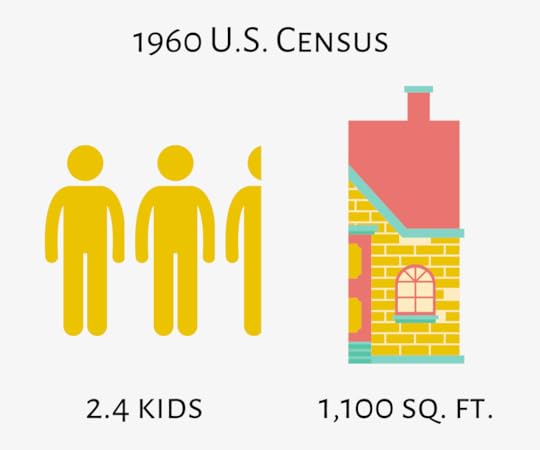
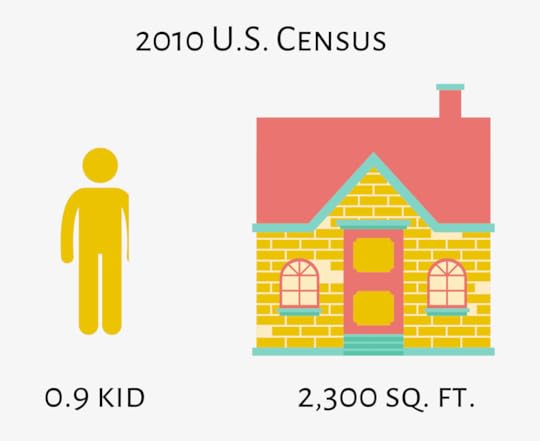
There is a famous law called “Parkinsons Law” which states that the duration of tasks expand to fill their allotted time spans, regardless of the amount of work to be done.
Work expands to fit time available.
The same thing has happened with space. According to the National Association of Productivity and Organizing, 75% of American households can’t park even 1 car in their two-car garage.
This has made self-storage a huge industry in the US with 39 billion dollars of revenue and it is enjoying exploding growth:
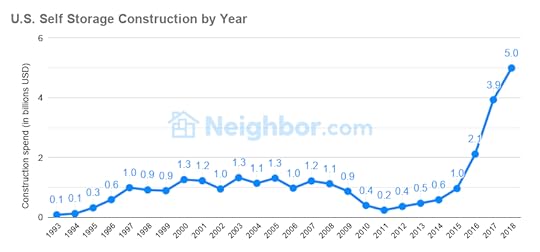
In 2022 there were more self-storage facilities (52,786) than the combined locations of some of the largest restaurant chains in the United States. (This suggests a new chain should open with self-serve facilities in every storage facility and we may have the next McDonalds or Starbucks created in a hurry).
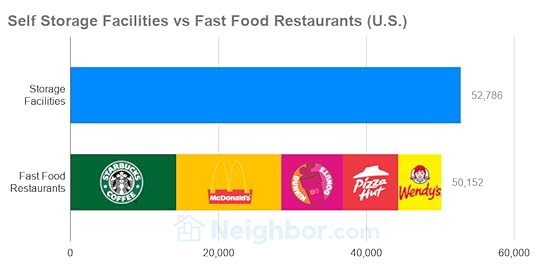
Unfortunately there is little co-relation between stuff and happiness. In fact there appears to be a negative co-relation as people a) compare their stuff with other peoples stuff, b) are tied down by their stuff..almost a legacy cost that keeps them rooted, c) have to pay a lot in increased rent or mortgage to house their stuff and d) apparently spend 17 minutes a day finding what they want among the stuff they have.
Thus the popularity of Marie Kondo and their ilk.
The irony is now we are surrounded by too much Marie Kondo and she also sells stuff!
Merchandise or “Merch” is the currency of the social media age.
 Another Philosophy.
Another Philosophy.One of my favorite books is called Vagabonding and one of my most popular posts was on the philosophy of Vagabonding.
Vagabonding is an outlook on life.
Vagabonding is about using the prosperity and possibility of the information age to increase your personal options instead of your personal possessions.
Vagabonding is not a lifestyle, nor is it a trend. It’s an uncommon way of looking at life-a value adjustment from which action naturally follows. And as much as anything, vagabonding is about time-our only real commodity-and how we choose to use it.
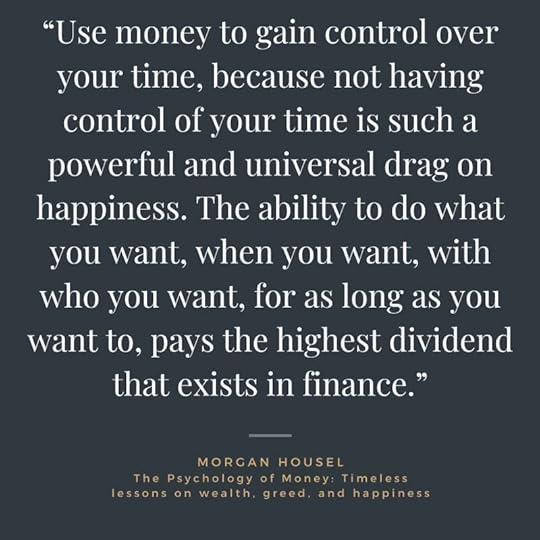
Among the best if not the single best book on wealth is Morgan Housel’s “Psychology of Wealth”. If you have not read it you are truly missing out on a combination of wealth and life wisdom written with such a fusion of intelligence, insight, illumination and inspiration that you are unlikely to look at money, finance and wealth in the same way ever again.
There are many many lessons and practical applications in the book but a key underlying message is simply one word.
Enough.
Here is one story:
“At a party given by a billionaire on Shelter Island, Kurt Vonnegut informs his pal, Joseph Heller, that their host, a hedge fund manager, had made more money in a single day than Heller had earned from his wildly popular novel Catch-22 over its whole history. Heller responds, “Yes, but I have something he will never have … enough.” Enough. I was stunned by the simple eloquence of that word—stunned for two reasons: first, because I have been given so much in my own life and, second, because Joseph Heller couldn’t have been more accurate. For a critical element of our society, including many of the wealthiest and most powerful among us, there seems to be no limit today on what enough entails.”
― Morgan Housel, The Psychology of Money
March 17, 2024
Keys to Success: The 3 Dualities.

Painting by Rene Magritte
Successful leaders, teams and companies that endure over the long run seek to find ways to balance, unite and integrate opposing dualities into a harmonic and flexible approach that leverage opposing tendencies without merging or averaging them.
Here are three key dualities we should all become masters of managing whether it be personally or for our organizations.
Roots and Wings.
Story and Spreadsheet.
Centralized Control and Edge Power.

Painting by Rene Magritte
Roots and WingsBetween 1962’s Lawrence of Arabia and 2020’s The Mandalorian there is much in common including each being an innovative use of a new film technology. It was 70 MM wide screen for Lawrence of Arabia and high-definition streaming for The Mandalorian which brought Disney into the future.
But in world view they are completely different.
In Mandalorian we sense a force and a code best captured in the line “This is the way” repeated throughout the series. There is a code of conduct almost religious. A way of doing things handed down over time. A deterministic march forward.
In Lawrence of Arabia a key theme is of old ways and traditions being challenged best captured by the line “Nothing is written”. The desert is empty, and the sands are wiped clean with the winds of change. The past is not an anchor, and one must write, sculpt, and invent the future.
Most individuals and firms must balance both the roots (history, legacy, anchored costs, reputation, provenance, rule of law and expectations) of “this is the way” with the wings (leaps of faith, casting of on a new journey, challenging the status quo) of “nothing is written”.
We must balance roots and wings.
Roots provide stability, a place to stand, a passed along tradition and a sense of history.
But roots alone which are important to ensure one does not get blown away by the winds of change might anchor one too much to the past and to a status quo which may no longer be relevant.
Thus, the importance of wings.
The ability to raise oneself and see above the horizon, to look down with new perspectives and to ensure that the roots which feed us do not wither by failing to adapt to a new world.
Roots nourish via what we were and where we came from and what we did.
Wings encourage us to go where we need to and to blaze new trails which will lay down tomorrows roots and are a highway to what we will accomplish.
If every individual and company is a story with a place we came from, every individual and a firm is also about a place we are going to.
We all integrate the dualities of roots and wings.
Too rooted and we may wither way as changing times and climate bring drought to the place and way we were.
Too winged and we may be blown away in the gusts of change.
Too rooted and we may be seen as old school, hide bound to tradition and inflexible.
Too ready to fly with change may find us painted as unreliable, undisciplined, and short-term oriented.
Transformation is twisting ourselves and companies into new shapes with the clay of what we were and new skills and pieces we acquire.

Painting by Rene Magritte
Story and Spreadsheet.Today we live in a data driven, silicon based, algorithmic powered world.
As we all fixate on forging things with the scalability, math and plumbing of data, a case may be made that true wealth and joy are being sculpted with the specialness, magic, and poetry of creativity.
A story is “data with a soul” and “we tell ourselves stories in order to live”
Humans seek the magical, choosing with our hearts and then using numbers to justify what we just did.
If humans made ROI decisions, we would not have children since on a financial and other numerical criteria they do not compute.
Disney has the “Magic Kingdom” and not the “Algorithmic Kingdom” and Disney+ invests in data and technological capital to ensure competitiveness but they differentiate using creative and intellectual capital.
Netflix stock price fluctuates on its ability to attract new subscribers which is directly co-related with its ability to launch new creative endeavors and its true difference today versus other competitors is not necessarily just it’s celebrated data but it’s ability to harness global creative talent versus most competitors who focus on creative national talent. Eg. Squid Games.
Until Novo Nordisk (maker of Ozempic and Wegovy) the most valuable company in Europe was LMVH (now number 2) the owner of Louis Vuitton and Tiffany and the most valuable company in the world was Apple. Both found ways to be spreadsheet operators at the highest level while differentiating on story telling and creativity.
Both companies have amazing supply chains and foundries/technologies, but they differentiate versus competitors and have an ability to charge significant premiums (they manage to get their buyers to forgo data driven decision making that many marketers fixate on) by focusing on provenance, materials, design, innovation, and storytelling.
Wealth and Brands are created through combining story and spreadsheet. Today when a new dawn of creativity and making is being unleashed and data and tech is being commoditized and offered as ingredients and service, we need to make sure we are focusing on our ability to attract, retain, train, re-aggregate and unleash talented creators and makers. And to do so in a flexible way, in fear free innovative cultures that modern technology and the new unbundled distributed workspace of tomorrow are enabling.
Let us stop fixating on the Arrows (how they are made, how many big lakes full of them we have and how cheaply we can buy them) and instead let us focus on the Archers.
Getting the arrows is not too difficult but attracting and motivating the archers is.

Painting by Rene Magritte
Centralized Control and Edge Power.If one studies the history of any firm you will find it oscillate from being centralized to decentralized every few years.
A firm may begin decentralized but then find some combination of issues with quality control, duplication of costs, complexity or a legal snafu results in a massive centralization drive.
Now centralized the company finds itself ossified and process driven. It is now too slow to move in a rapidly changing world with a one size fits all approach that is rejected by different types of firms that the company is comprised of or a lack of sensitivity to different geographies. The center is too far removed from the day to day reality of business trench warfare and and so the pendulum swings the other way.
Stay in a company for a decade or more and you will go on a round trip ride from one dogma to the the other.
The reality is that successful companies combine both of these tendencies at the same time rather than swinging wildly from one side to another.
There are significant advantages driven by the scale of spending ( combined they give a buyer leverage), quantity of data ( in a world of large language models one needs firm wide access to data) and emerging challenges (responsible AI) which require a centralized approach either at a country, regional or global level calling for a co-ordinated approach as a starting point for legal, data, account/client management and procurement services which are then adapted and tailored for local realities of culture and law.
On the other hand innovation and experimentation occurs on the edge and many accounts and clients are deeply idiosyncratic in the way they do business and expect to be serviced uniquely in customized ways. In these cases the edge drives the interaction and innovation which is then reported back to center who a)create new best practices by identifying patterns across markets and b) modify any central edicts in response to the twitchy signals from the edge.
World class technology that enables information to flow freely and a culture of open communication and collaboration with a focus on excellence are the key factors that allow the combination of center and edge.
If the tech and data enables but the teams are engaged in a civil ware it will not work.
If every body gets along but there is no data and tech sensitivity to calibrate and implement changes in real time will also fail.
The debate of center versus edge is so twentieth century.
It is now combining the duality of center and edge.
Roots and Wings. Story and Spreadsheet. Center and Edge.
Duality wins.
March 10, 2024
Fractionalized Employment Now!

Photography by Albrecht Voss
Most of us need to work and it is central to our identity.
Yet, even though work is important most of us do not define ourselves solely by work.
We have many other identities and responsibilities (parent, caregiver, sailor, artist…) that make us who we are or passions we wish to pursue.
To integrate and deal with the spectrum of what life brings we could work at a job with all its benefits but also constraints or be a free-lancer/independent worker with all its freedoms but uncertainties.
Today due to several forces there is the possibility of another way as we architect the future of work.
A way that benefits both the individual employee and the firm.

Photography by Albrecht Voss
Four Forces.Four con-current forces are re-sculpting the nature of work and what constitutes a company in the most dramatic ways in over a century.
1. AI: AI will significantly enhance productivity. Companies will be be able to do more with less. While new types of jobs will be created and enhanced productivity can allow companies to invest in new areas so employment will grow, it is very likely that the need for employees in any existing knowledge role will decline.
People will either do higher level tasks or be trained for new tasks or see a demand for their existing skills diminished.
2. Declining populations combined with an explosion of older people: Except for the continent of Africa most countries particularly Europe, the US, China, and Japan which account for most of the global GDP are seeing shrinking populations.
At the same time all these countries are seeing rapidly aging populations with 10,000 people turning 60 every day in the US. Many of these aging folks have skills and expertise that will remain critical in an AI age ( perspective, mentoring people, expertise in craft) and are likely to want to or need to work for financial or other reasons but may not want to or be in a position to work full-time.
3. Covid-19: Unbundled and distributed work has changed people’s mindsets. Our minds are like champagne corks that once opened swell and do not fit back in the bottle. Everything is being questioned from the nature of work to the role of management.
People want to and need to work but many now no longer ask how do I find time for my life in a world of work but rather how does work fit in my life?
4. Generational Mindsets and the Side-Gig: Today’s reality is that 66 percent of Gen-Z with a full-time job in the US have a side gig or side hustle and 76 percent want to work for themselves. A plethora of new marketplaces from UpWork to Etsy to Shopify are enabling the feeding of passion projects, enhancing optionality and increasing income.

Photography by Albrecht Voss
The Fractionalized Employee.Today most companies combine three types of work forces.
1) A full-time employee,
2) A full-time or part-time contracted employee from another firm (e.g., Wipro or Cap Gemini)
3) Free-lancers (directly or via an intermediate firm)
Full-time employees are usually the backbone of any company and its culture with contracted and free-lancers being mixed in to expand expertise and manage oscillating workloads in a cost-effective manner.
We may now want to think of a fourth type of worker to reflect the forces of technology, shifting demographics and new mindsets: The Fractionalized Employee.
Imagine if one could get both the continuity and loyalty of a long-term employee with the flexibility of cost management of a part time employee and the expertise of a free-lancer and do so in a way that both grows employees and retains them in the long run.
This is the Fractionalized Employee.
Every employee in the company is given a choice to work 100%, 75% or 50% of their time.
They get to select this at the beginning of every year or can adjust to a different level when a life event occurs (health, birth of a child, need to take care of a parent, a passion that needs to be attended to or other life issues).
No longer does an employee have to choose between staying or going or being torn trying to do two things at one time. If they wish to try out a different type of non-competitive job (starting a gaming company –assuming they are not working at a gaming company--or being an artist or writing a book) it behooves their employer from letting them do so because retaining half or three quarters of a talented person is better than zero. As importantly these external skills or vocations will make the employee better rounded and probably more productive. And there will be cost savings from both reduced compensation but also eliminating the friction and cost of severance, re-hiring, and training.
And as AI makes companies realize they need to change, adapt and manage new talent mixes, fractionalized employment allows for a smart way to manage costs by dialing down employee cost while ensuring the dignity of continued employment, the security of continued health care and the enablement of those employees using the non-employment time to earn revenue or build new skills for an AI age or take care of personal needs.
And it will probably attract a lot of talent who may want to work 50 to 75 percent of their time.
Including the more seasoned who might only want to work half time. As countries grapple with aging and declining populations this is one way to address this issue.
For the employee they do not have to give up an income stream, health benefits or a part of their identity to build new skills, pursue new horizons or take care of life’s events. Over the course of a career, they can dial up and down the percentage they work.
The Fractionalized Employee model will allow companies to retain talent, grow talent, mix, and match talent in ways that are truly win-win.
Employees gain greater flexibility, optionality, opportunity for growth, managing life stages, and time to build additional expertise.
Employers can attract new types of talent, retain starts, elongate the careers of seasoned experts and long time employees, calibrate costs in humane ways that do not negatively impact culture, and enhance adaptability to changing circumstances.

Photography by Albrecht Voss
Overcoming the hurdles to Fractionalized Employment.The fact that outside Australia and some countries in Europe this is a very rare option is due to several concerns among employers which need to be addressed.
There are many concerns from it will be hard to implement to employees will use this to prepare for their next gig to customers and clients will find it un-acceptable.
We must lose these controlling mindsets, fear filled mindsets and lack of imagination mindsets.
Employee Flight: Talent is not owned by a company. They work for the company. Giving them more flexibility is likely to increase retention since talent can now do their side hustle or passion project openly and bring that expertise and credibility into the company. The time they have for themselves can help them look after their families or try new stuff without having to leave their company. They often can also discover that the the grass is greener on the other side because it is fertilized with bullshit. Trust talent and they will trust back.
Client/Customer Challenges: Clients and Customers are likely to embrace this for a variety of reasons. First they are likely in an AI age want to continue to access their key talent but given productivity increases not need as much. Second, if given a choice between not having access to the folks they want or less access they are likely to opt for limited access. Third coverage can be guaranteed because fractionalized employees can be 100 percent available during key periods and the savings from their compensation can be used to provide customers with a wider palette of talent or other coverage.
Most talent organizations are really good and can definitely incorporate this new type of worker by adopting the following process to make this manageable:
Limited Choices. Employees who wish to work less than full time but get full health benefits and pro-rated financial benefits such as bonuses or equity should be given only two alternative levels--50 percent of full time or 75 percent of full time. This limitation makes the program easier to administrate and manage. If people were allowed to select any percentage, it would be a nightmare for payroll and to arrange coverage when they were off work.
Limited Sign Up/Change Periods. An employee can only decide to change their percentage once a year during a particular two-week period—perhaps in September of the previous year for the following year. The only exception would be a major life or health event. This enables companies to forecast how many workers they will need and how work gets covered. It also enables far easier administration.
Limited Eligibility. Being selective helps funnel high performing candidates into the fractionalized program, a key measure since the program is designed for the company’s best talent and those who are well-versed in the company’s culture and processes. To limit eligibility, the following criteria are useful:
a)Having a minimum number of years of service. For example, one must have worked in the company for at least x years full time before being eligible.
b)Achieving a specific level of performance or a minimum rating level (only candidates with levels evaluation).
c)Restricting eligibility. Certain roles which require full-time presence such as overseeing a large team or providing continuous service to a highly demanding customer.
Companies that allow for Fractionalized Employment are going to have a significant advantage in a world of AI, changing demographics, new mindsets and emerging marketplaces.
March 3, 2024
The Rise and Fall of Giants?
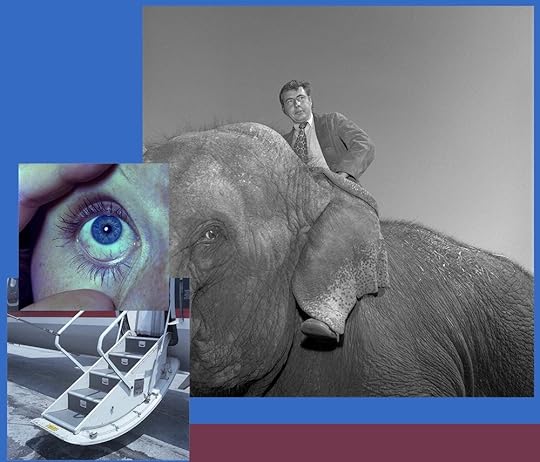
Photography by Aline Smithson
When companies like AT&T, IBM, General Electric and General Motors were the world’s leading organizations in the 20th century, it seemed as if they might always occupy their lofty positions. Few could envision the emergence of new, dominant companies and industries. Apple, Google, Amazon and others rose with astonishing speed to become leaders in their categories.
Will this new era of the four shifts of power, demographics, mindsets and technology bring about a tectonic change in the corporate landscape?

Photography by Aline Smithson
A New Breed of Companies?Will the same scenario take place in the years ahead? As tempting as it might be to predict that we’ll have a similar changing of the guard in the future, the following graphic provides a needed corrective to this thinking, showing the most valuable companies over the last three decades (Source: GPT-4):

The lists are surprisingly similar, with four types of companies dominating the list (technology, pharmaceuticals, energy, and financial powerhouses) and Walmart.
This is a decade, two decades and three decades after the birth of the Internet. With the exception of GE, most of the companies or their immediate competitors remain the same over two and sometimes three decades.
Some new technology companies like Apple, Nvidia and Taiwan Semiconductor make the list today, replacing a Nokia, IBM, and Intel. Why? Because Nokia failed to re-imagine phones and let Apple thrive; Intel failed to re-imagine chips, allowing Nvidia take the lead; and IBM couldn’t grasp the next generation of many things including silicon manufacturing, giving Taiwan Semiconductor an opening to dominate.
But overall, the top lists are remarkably similar by type of company with really only one new entrant, Meta, built on the relatively new social media category.
Given this historical performance, the list of leading companies a decade from now shouldn’t be that much different from the 2023 list. It’s likely that Apple, Alphabet, Microsoft, Berkshire Hathaway, Johnson and Johnson, JP Morgan, Procter and Gamble and Walmart will remain in the top 25. Accompanied by a big Credit Card company, a chip manufacturer, and a big energy firm or two. Tesla may remain if it morphs into an energy or AI firm but otherwise it may be a one decade wonder.
They and other major corporations have been taught the need to adapt and incorporate the latest technologies and ways of working and learning—the cautionary tales of Nokia and GE have not been lost on them.
At the same time, we’re bound to see the rise of certain companies in certain industries:
AI: While Alphabet and Microsoft are well on the way to become giants of an AI age, they are likely to be joined by new players such as ByteDance, the parent of Tik Tok, Open AI and other firms being newly launched. Will Nvidia which just in the past few months has risen to being the third most valuable company linger on these lists for decades or will new open and light models from companies like France’s Mistral reduce its expected dominance?
Biotechnology: In addition to AI, it is likely that a new giant or two focused on biotech like a Moderna will emerge.
Climate Technology: As concern about climate grows, so too will the companies in the category—at least one is bound to emerge from the pack, especially if they’re able to address major concerns in a way that is innovate and effective.
Tech Enabled Disruptors: These might be a Stripe or a Snowflake or companies of the same ilk.
India: In addition it would be surprising if a decade from now if one or two companies were not from India whether it be a Reliance, a Tata or a Adani.

Photography by Aline Smithson
Companies will operate differently.While the mix of leading corporations may not change dramatically, they will operate differently from the way they did in the past.
Fewer employees due to increased productivity: They will have fewer full-time employees because they will leverage the power of AI to do more with less and use marketplaces to utilize more part time workers to ensure flexibility and speed in a shape shifting world.
This does not mean there will be less employment since some companies while being more productive will be more profitable and fast growing. In addition significant job growth will come from a larger number of smaller companies as well as many people earning income from more than one company or gig at the same time.
They will be far more geographically distributed: As the world becomes far more multi-polar with the continued rise of India and China among others and the ability of modern technology such a spatial computing to facilitate working from anywhere.
Employee Joy: It is likely that companies will run with a greater focus on employee joy as talent and culture will become the key differentiator as other areas become commoditized.
In an increasingly advanced digital silicon world, almost everyone will have access to the same tools and technologies and the differentiation will come from traditional analog carbon wealth called people or humans. Leaders and companies that can attract, retain, grow and align this human capital will be the ones that will flourish.

Photography by Aline Smithson
A Whale and Plankton Eco-System of Mutual Enforcement.Perhaps the biggest change in the eco-system of companies will be the proliferation of smaller companies connected directly and indirectly to the giants. As members of younger generations want to work independently or pursue side hustles and as technology makes this increasingly feasible, the giant corporations will become reliant on millions more small businesses and independent contractors.
It will be the whale-and-plankton paradigm.
The debate between big and small is a false debate because the future model will need big and small working together.
There will continue to need to be the need for “old scale” which is the scale of resources, scale of size, scale of spending and scale of manufacturing in almost all industries.
To create break throughs in computing, bio-technology, transportation or many other fields one will require the investments to capital, huge pools of data and the ability to invest in R&D over years as the large pharma companies such as Merck or Pfizer, technology companies like Google and Microsoft and transportation companies such as GM and Toyota do.
It takes tens of billions of dollars to create the architecture for AI for instance.
On the other hand these large companies create the infrastructure as well as the spending power that allows thousands of other companies to feed off their investments, spending, distribution and pioneering.
This is where the new scale of networks, talent, ideas and creativity will be the differentiators.
Apple supports tens of thousands of developers who leverage the App store, Google’s You-Tube enables millions of creators, Amazon enables sellers and Microsoft provides cloud and computing services that anyone can plug into.
But it is not just the small companies that feed of the big but the big ones feed of the small both in generating income through fees (cloud services), commissions (percentage of revenue for being listed on an app store), revenue generated ( You-Tube running advertising against creators) but also as places of innovation or talent that they can buy and scale ( Meta bought Instagram, many pharmaceutical companies buy smaller bio-tech firms)
This dance of big and small constant and continuous will continue in the future.
It will less be a rise or fall giants but the dance of an eco-system of companies and talent constantly connecting, flowing and adapting as they seek growth.
The future will be fluid and to thrive it will be key to be flexible both as an individual and a firm.
February 25, 2024
Perfect Days.

The photographs above are a sampling of the public toilets in Tokyo.
From the New York Times:
“Perfect Days” — which was Japan’s entry to the Oscars in the international feature category, and landed a nomination — started life when its director, Wim Wenders, was approached about working on a project that would elevate the profile of Tokyo’s pristine public toilets. He proposed a narrative feature, and the film was born.
“Perfect Days” is currently in theaters in North America ( it will be available in a few weeks on major streaming platforms) and is one of the five nominees for Best International Film at the Oscars.
Koji Yakusho won the best actor award at Cannes this summer.
It is one of the best pieces of art I have experienced in that it takes you everywhere by not taking you anywhere.
This work is probably the best in decades by the legendary Wim Wenders who has the eye of a photographer and the soul of forever. We see him here working at peak form combining with Kojue Yakusho one of the finest actors ever to make every scene, every gesture (much of the movie is silent or only has a soundtrack) feel so fresh that it is shocking how the ordinary becomes the extra-ordinary.
It is movie where nothing seems to happen in that the movie repeats the ritual of every day in the life of a toilet cleaner living by himself.
He gets up. Brushes his teeth. Gets dressed. Gets a coffee from a vending machine. Gets into his truck. Cleans toilets. Has the same lunch at a park where he takes a photograph. Cleans toilets. Goes to a public bath to wash himself. Goes to dinner at the same place. Reads a book. Goes to sleep.
Again and again.
On weekends the work is replaced by laundry, a book store and a dinner at a bar.
It is Zen.
As a movie.
If you take two minutes to watch this official trailer it encapsulates the rhythm and mood of the film.
What makes the movie remarkable despite what may be the absence of a plot, special effects, or fast action is that the viewer begins to sense that this is unlike anything they have seen and we become aware that every day is special in its own way even if it seems like every other day.
Its about learning to see. About the movement of trees. The play of light. The rustle of wind and the connection between humans that do not need words. It is so differently paced that it will take your breath away.
It is about being increasingly sensitive to a finer shade of differences.
A judicious surrender to the force of opposing tendencies.
A secular grace of intense feeling.
It reminds us to see around us and to live deeply in the moment. To find happiness in the crevices of every day versus looking for it elsewhere at another time.
"Repetition as such, if you live it as repetition, you become the victim of it. If you manage to live it in the moment, as if you've never done it before, it becomes a whole different thing".
"Next time is next time. Now is now”.
It is also about the loss that comes from the digital world as we see the main character use an analog camera, chemical film, a flip phone, cassette tapes and paperback books in hyper modern Tokyo.
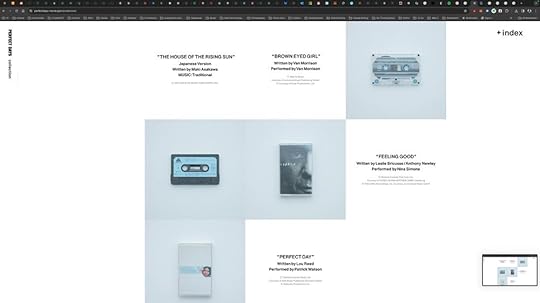
And the music is extra-ordinary…here is the soundtrack:
To get as sense of the art, craft, excellence and attention to detail and feeling spend a little time at the official website (scroll around and click on index). It is one of the best online experiences that will inspire every artist, creative, marketer, designer, agency, brand…anyone.
Click here or here: https://www.perfectdays-movie.jp/en/ or right click on the image below to begin the experience
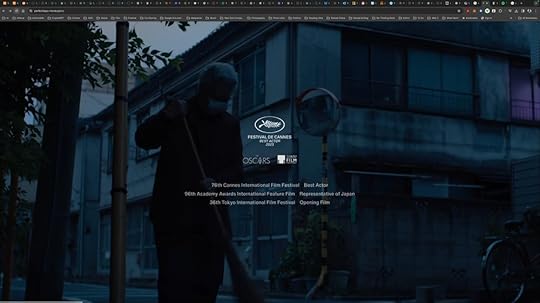
If you have ever wondered about the creative process one could do no better than watch the video below on Wim Wenders revealing how a movie about toilets led to an actor led to a character led to Zen which led to Leonard Cohen which led to the music selection…
Creativity is connecting dots in new ways that surprise (critical for humans in an AI age)
Here are some fragments from reviews of the movie
NPR:
Dealing with life's limitations is the theme of Perfect Days, the latest movie by Wim Wenders , the venerable German director for whom Ozu has long been an idol. Shot entirely in Tokyo — in Japanese — this elegant, sentimental fable is Wenders' best fiction feature in decades. Although it flirts with glibness, Perfect Days asks questions about how to live in the face of need, loneliness and disappointment.
We twice hear the song "House of the Rising Sun," the old folk tune lamenting a life ruined by time spent in a house of ill repute. Yet the movie itself is no lament. Wenders once dreamed of being a priest, and here he nudges us toward transcendence. Constantly showing us daybreak over Tokyo, he reminds us that the true house of the rising sun is the world. But rather than bemoan the ways that the world is dark and disappointing, the film suggests that we find and appreciate the transient beauty around us. This may not make our days perfect, but it will make them better.
Time:
The idea, maybe, is that in seeking a comfortable closure—to a song, to a movie, to a random day—we’re looking for the wrong thing. That’s what Perfect Days, its title borrowed from one of the most beautiful songs Lou Reed ever wrote, is about. We seek meaning in everyday life, not realizing that life every day is the meaning.
Try to see it.
You will come away different.
February 18, 2024
Future-Proofing Ourselves

Image by GPT-4
Earlier this month:
“Meta Platforms Inc. tripled its profit and posted sharply higher revenue in the final quarter of 2023, boosted by a rebound in digital advertising as well cost cutting and layoffs in what CEO Mark Zuckerberg called the “year of efficiency.””
Meta increased revenue by over 25 percent from year ago with nearly 25% fewer employees.
In the first six weeks of this year according to layoffs.fyi 157 tech companies have laid of 39,608 employees a rate faster than anytime in the last few years.
In the much smaller media content sector the rate of job losses is the highest it has been with at least 8,000 job cuts made in the UK, the US and Canada last year, include 300 jobs lost in the collapse of news startup the Messenger; 70 at Business Insider; about 30 at Time; 115 at the Los Angeles Times; about 50 to 100 people at NBC News; and 12 at Condé Nast’s Pitchfork.
Three forces are fusing and re-sculpting employment and the workplace. 1) Technology. 2) Unbundled and Distributed work. 3) Just in time global marketplaces.
A board room that is not planning on how to leverage some combination of the exponential productivity power of AI, the ability to hire talent anywhere due to unbundled distributed work, and the availability of global marketplaces for just in time resources from talent to technology to re-imagine, re-think and re-invent their business will soon lose their board seats or control of their company.
Why would anyone run a company in 2024 the way they ran it in 2019? If one launched a firm today would it look like the firm of 2019?
As the cost of knowledge goes to zero and it becomes clear that AI is significantly under-hyped every knowledge workers job will change before the end of 2024.
The rate and impact of change of new workplaces, new markets and new tech feeding off each other will drive greater change much faster than seen in decades.
This is not the time to wish for the best, keep our head down, hope that we can retire before the tsunami hits or wait for our company or boss to help transform us.
Delegating our future to anybody else is not a good strategy.
Starting right now we must invest time and resources to hone, sculpt and architect the six key skills will be essential in the future to complement machines, co-exist with change, and ensure continuous re-invention.
Three of these have to do with individual competence (Cognition, Creativity, Curiosity) and three how we connect with each other and the world outside our minds including new AI agents. (Collaborate, Communicate, Convince).
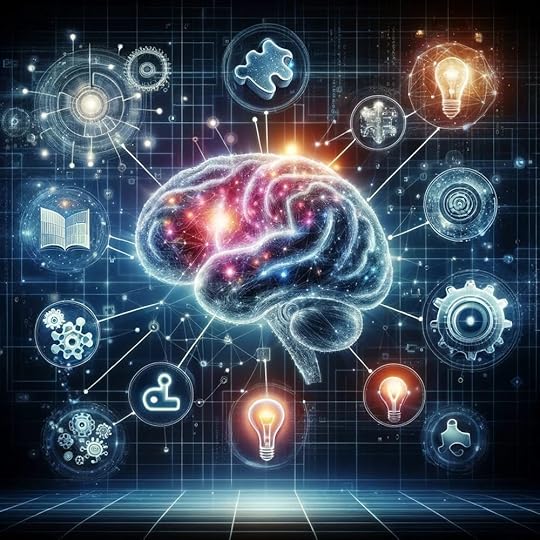
Image by GPT-4
CognitionCognition is simply learning to think and keeping our mental operating system and skills constantly upgraded.
It is no longer good enough just to be up to date.
We need to be up to tomorrow.
This requires deliberate practice and sustained work. Improved cognition is achievable.
But one must work at it and many of us are so swamped with keeping up with our daily workload that we do not invest in growing our skills and expertise. This proves to eventually lead to irrelevance as the needs for yesterday’s skill sets erode and one has not replaced them with a new set of skills for the future.
If we cannot upgrade our mental operating systems we will become less relevant.
Start using and leveraging Microsoft Co-Pilot or Gemini Advanced or the Open AI set of tools. Buy the paid version since they are six months ahead of the free version and far superior. The increased productivity and time savings will be multiples of the fifty or sixty dollars a month one might spend to subscribe to multiple resources and free up the time we all claim we do not have.
Also begin thinking of operating like a Company of One by combining skills, reputation and collaboration that your existing company would want to hire or partner with.
The more you have options the longer you will stay in a company you love. Maximize career optionality to ensure long term career in one place. Read how to become a company of one.
And here is a step by step way to learn how to learn and to unlearn.

Image by GPT-4
CreativityCreativity is connecting dots in new ways, looking beyond the obvious and this skill will be key as AI powered computers, data crunch and co-relate faster than we ever will.
To be human is to be creative.
Creativity is at its heart the way we deal with a world of change by adapting, evolving, and re-inventing.
We need to learn and feed this inside us. The future will be about data driven storytelling and not just data or storytelling and the ability to leverage modern machines and algorithms to unleash connection and meaning will depend on creativity.
This requires every one of us whether we are creative or not to start using the latest tools that will turbocharge creativity. If you wish to see what is possible spend a few minutes looking at how you can create video with text in seconds without having any coding or video or traditional creative skills here:
If you were impressed great. If not wait six weeks and it will be twice as good. That is the rate of advancement we are witnessing.

Image by GPT-4
CuriosityCuriosity is simply being alive to possibilities, questioning the status quo and asking what if? Today the key competitor or opportunity in any category comes from outside it.
Curiosity may have killed the cat, but the lack of curiosity killed the careers of many people. When boundaries between industries shift and our minds are like champagne corks swelling and no longer fitting into the past the key is not to accept but question the status quo.
AI co-relates and connect dots and look back but rarely anticipates forward and what is next. Humans ask why? As well as why not?
By constantly upgrading our cognition, expressing our creativity and feeding our curiosity we seize tomorrow versus fearing tomorrow.
The 3C’s of ConnectingBeing cognitively up to date, creative, and curious will not be enough since we are living in a connected world where eco-systems, teams and linkages are how ideas are born, value created, and long-term careers forged. For these we need to hone and build and train for three other skills which are collaboration, communication and convincing.
The parts of our job that are built around collecting and arranging information and data, or monitoring, allocating and distilling is rapidly going to be done either by machines or someone in a market far away but the ability to work with people, write and present and be a world class sales person taking the data and new resources to build new stories will remain relevant.
The machines and the markets will not be the differentiator it is how we work with them, present and convince others will.
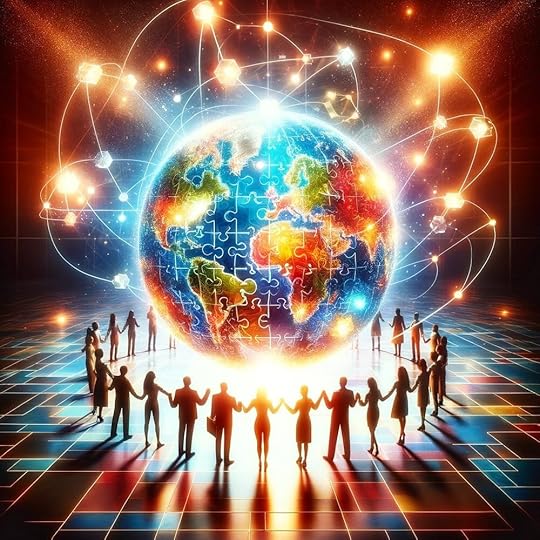
Image by GPT-4
CollaborationCollaboration is key to work in a world where API’s (Application Protocol Interfaces) are not just about handshakes between software/hardware but between individuals with different skills, teams in different countries, partners, suppliers and much more.
As the world re-imagines and re-configures itself we need to be like Lego pieces and learn to fit and connect and combine with others to transform ourselves and our companies.
Collaboration with others and machines which we will learn to complement is a way to ensure that EQ and HI (Human Inspiration) will add value to the IQ and AI of digital agents and algorithms.

Image by GPT-4
CommunicationGet better at writing. Enhance presentation and speaking skills.
It may be so old school but watch the people who succeed, and they are good at communication.
Combine the roots of old traditions of writing and speaking and human engagement with the new methods of AI and cloud marketplaces.
Learn to provide points of view not just data, provocation versus the both sides information dump that AI is engineered for, perspectives that combine past and future and math and magic.
Great communication skills will be the differentiator versus chat bots and virtual presences.
But communication is not a one-way street and as important as it to write, speak and present it is as critical to be able to listen, to hear and to understand what others are saying with an open mind and a sense of empathy.
Empathy and looking for the unsaid and unexpressed is what the machines cannot do.

Image by GPT-4
Convincing.Every one of us is a salesperson regardless of what we believe our title is. This is true even if we do not sell anything at work. We must convince colleagues of our points of view.We all must learn to convince and learn to sell.
Humans choose with their hearts and use numbers to justify what we do.
Humans are stories. Stories are data with a soul.
Convincing is often a soup of facts and stories.
By investing and combining the Six C’s ( Cognition, Curiosity, Creativity, Collaboration, Communication, Convincing) each of us can thrive in the new future and help our companies and customers grow.
These skills will never grow old or out of date and will ensure that we can embrace the future, adapt ourselves and organizations to whatever comes and complement others and machines in ways that are synergistic
Images by GPT-4
February 11, 2024
Ghar.

Earlier this week I spent some time at an extra-ordinary place in the city of Pune, India which is about 100 miles from Bombay ( Mumbai).
It is called Ghar which in Hindi means house or home.
It is a seven floor building in an area surrounded by various Indian Army facilities and it serves three purposes which enforce each other
An Orphanage: It provides shelter, food, education and love for 40 orphan girls.
A place for Disabled Women: 9 partially paralyzed women are provided housing and rehab.
An elder age home: 19 retired people are provided a place to live.
This way three generations live in one home with the orphans surrounded not just by teachers and administrators but a true family. They have “grand parents” and provide help and comfort to the disabled women who would be their mothers age while the elderly have ready made “grand children” and the voice and commotion of the young.
I spent some time with Colonel Mickie Uberoi who along with a few other retired officers of the Indian Army pooled their resources and raised funds to create this amazing space. The six minute video below is very much worth a watch:
A Culture of Excellence with a Growth Mindset.The army officers wanted to ensure that the orphans were raised in a culture of excellence.
They just did not want the orphans to have a place to live but a way to boost them for their entire life with a combination of education, mentoring, getting used to a good quality of living and exposure to the very best experiences available in Pune.
Each one of the girls are told that their goal should be to have an impact on society and find ways to help others.
It begins with early education in the orphanage imparted by great teachers and then placement in the best schools including army schools that the match the ability of each girl. Each girl is encouraged and supported to be world class. When they return from school further tuition is provided in the evenings to ensure the girls do not fall behind.
Tennis table training and basketball and other sports are also made available and the girls are often invited by surrounding institutions to see parades, shows and as many activities to expand their horizons.
The quest for excellence can be seen in the space which while filled with the sound of laughter and learning is intensely clean with a gym, a meditation room, a garden and a rooftop terrace.
To ensure a sense of self and not subservience but respect they are asked to refer to their elders as aunty or uncle but not “sir” or “madam”.
 Freedom within a Framework.
Freedom within a Framework.When we saw the youngest girls we first thought they were boys (see above) but were corrected.
The administrators have discovered that some of the girls with long hair had issues with lice so everyone has a short haircut till they get a little older. This way no one feels different but they can also look at the older girls with longer hair and know the hair they have lost is coming back.
When they are in the orphanage they all have a uniform of jeans and long sleeve shirts but each girl also gets to select their own wardrobe for special events and for when they leave the facilities to go to events or outings.
Each girl decides what she would like to study and what sport she would like to play and then they are provided with a disciplined course to achieve their goals.
It is a wonderful way to have a process and rules for everybody but then many things are personalized for each person.
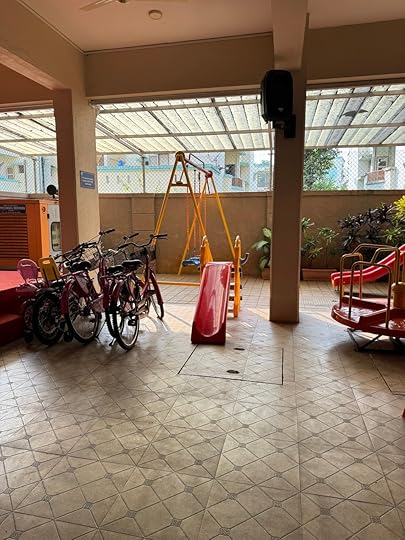 A Canvas for Generosity.
A Canvas for Generosity.Ghar has become a canvas for people in Pune to paint with their generosity.
The joy that comes from giving and helping others is enabled by the scaffolding of volunteer opportunities that it provides.
Services: Doctors and Dentists are not just available on call for the residents of Ghar but many have fixed hours where they come in every week or month and staff the medical rooms.
Materials: The picture above shows a small section of the indoor but airy playground. Different individuals give and maintain their gifts whether it be bicycles, slides or basketballs.
Experiences: Tickets to events or invitations to things like parades or fireworks are provided for some or all of the inhabitants to they are exposed to a wide range of experiences ( and get to wear their going out clothes).
The fact that every one can help in their own limited way from spending an hour providing free medical care or funding a basketball ensures that limited time or resources should not stand in the way of people who might want to help.
 Future Forward Thinking
Future Forward ThinkingThe retired Army trustees believe that the orphans they are housing today will be the ones to keep Ghar running after they have aged out or passed away.
The belief is that as the girls graduate and go out into the world this place will still be their home since it where they grew up. It will not just be their roots where they will re-connect with others they grew up with but the hope is that they will fund, run and maintain it for the next generation of orphans.
Everyone is reminded that this is not a home they are staying in but it is their home that they have to keep going because helping a single person makes a big difference.
Or as the Ghar slogan reminds us:
“Helping one person may not change the whole world, but it can change one person’s whole world”
February 4, 2024
Remaining Relevant.

The issue everywhere.
The one that lingers in the air.
After the pretenses are stripped bare.
That every manager and business share:
Is how does my business remain relevant?Are our business models up to snuff?
Do our partners and suppliers have the right stuff?
Will the business hold when things get rough?
Why is managing talent so tough?
How do we as leaders remain relevant?How will AI change my job?
What challenges will it lob?
Will it of my livelihood rob?
The pace of change why does it makes me sob?
How do I in an AI age remain relevant?The answers are slowly starting to emerge.
This is not the time to sing a dirge.
Instead towards this new world we must surge.
And some old ways of thinking we need to purge.
Maybe re-inventing, re-learning, re-thinking are the ways to remain relevant?It is a time to invest big and dare.
A time to realize that AI while key will be a commodity and not rare.
AI while essential unlikely to differentiate from competition when buyers compare.
Rather how does one optimize the AI and HI (Human Inspiration) pair?
Maybe embracing tech alone may not be enough to remain relevant?Embracing the tech is a key.
It is however but the entry fee.
The difficulty is how to adapt our current ships to sail in this new sea.
How to ensure the machine complements and does not replace me.
From the noisy confusion we must find fusion to remain relevant!What is important is that every one of us must seize the day.
Take the time and even invest to learn from part of our pay.
Do not only depend only on the employer to equip you for the future way.
The more up to tomorrow you are the more in your job you will be able to stay.
Do not delegate the task to others of you remaining relevant!The age of de-bossification is on the way.
Do not just manage, monitor, delegate or measure your talent will say.
They ask what have you created, built, made or who have you mentored today?
Inspire and help them grow and only then they will stay.
Adapt and grow as a leader is the way to remaining relevant.The future despite the screeching headlines is bright.
Seize the day and all will be right.
To twist and transform ourselves into new shapes is the fight.
From the dark we will emerge into the light.
Only when we transform do we and our company remain relevant.
January 28, 2024
Driving Changes; 8 Learnings.

1. Change Sucks: While many folks’ prattle on how "change is good" and should be embraced, the reality is that change means doing new and different things and trading in the comfortable, the tried and true and what one knows for months or years of stumbling, inventing things on the fly and looking quite incompetent. Let’s be honest with folks who we would like to help change and acknowledge that it is difficult.But while change does suck, irrelevance is even worse.
2. People are analog: As much as the world is going digital, people remain analog. We have emotion and we make decisions that are not entirely rational. We care about how we are perceived; we love our turf, and we fear uncertainty. Unless one can understand the human needs and concerns when one is looking to deliver change it can get very difficult.
3. Incentives are critical: As Stephen Levy the author of Freakonomics makes clear, to understand someone’s behavior it is critical to understand their incentives. We behave like we are paid to behave. So, whenever anybody wants a key to to drive change, they should start with changing incentives. So many industries continue to reward and provide incentives for the status quo while churning out press releases about change. Change only happens if it makes economic and career sense.
4. Fear must be reduced. Because change is associated with fresh and new things it is also associated with a higher degree of failure. Cultures that penalize failure find themselves ossified to the past. The big difference between Silicon Valley and Japan is their perspectives on failure. In Silicon Valley failure is a badge worn proudly while in Japan it often leads to suicide due to loss of face. There are no second chances in Japan and multiple chances in Silicon Valley. If a company had a high fear level (do people whisper? are folks afraid of the boss?) than the change I recommend to folks is to quit and find a better place.
5. Culture must be paid attention to. Every company has its culture. Some are strong and some weak but often successful companies have very strong cultures. This culture has often been the reason for the company’s success but sometimes may be its weakness in the future. Changing or attacking a company's culture is very intricate and requires both the patience and the precision of a surgeon. Eliminating some key parts of a Company's culture without understanding its importance or role it serves can not only be detrimental to change but also cause the change agent to be tossed out. The best change agents are experts at understanding company cultures.
6. Tell all the Truth but tell it Slant. This advice is from the poet Emily Dickinson. She goes on to say, " the truth must dazzle gradually, or every man be blind...". Full frontal attacks, hysterical statements about "dead business models" and other melodrama may make good blog copy or conference panel grist but rarely is effective in getting large successful firms to navigate change. The facts must be stated without personal attacks or offering choices that must be made at gunpoint or under fear. Let the facts speak for themselves. Let the reality dawn and rise versus going from darkness to high noon.
7. Bring Data, Facts and Examples. Once a company gets emotionally ready to change, it still needs a lot of facts and examples and here one must be ready to interrogate the company's legacy metrics of success. For instance, most content companies are under the mistaken belief that their content is valuable and can be monetized when the truth is that access to content and new ways of monetizing content is really the future. Data and examples that illustrate this gets the attention of the money folks and the strategic leadership of a firm whose support is key to drive change.
8. Inspirational Leadership is key: At some stage the numbers can be supportive, fear can be reduced, people’s incentives aligned, and the cultural issues addressed but that alone is not enough. At some stage there is a jump into a void that must take place. It is here that the leadership of a company must stand up and inspire. People follow people and not power point.
January 21, 2024
Davos 2024 = Davos 2017?

Here are my key takeaways from Davos…
The key themes were AI, China showing up in force and worries about it, the breakdown of trust, the need for business transformation, an increasingly polarized world with rising nationalism. These topics and concerns overwhelmed the more recent disruptions caused by the Russian/Ukraine and Middle-East troubles.
If you have been reading summaries of Davos 2024 that just concluded , you probably are familiar with these points.
But here is the zinger…my write-up below was written 7 years ago which was the second last time I was there in person! (Here is the link to the original post.)
This suggests that a) real trends are long lasting , b) change happens much more slowly than the headlines suggest since it takes time for organizations and people to transform and c) all of us should focus more on the signal than be distracted by the noise.
The key drivers remain the same and every one of us should align ourselves and our firms with these underlying challenges and opportunities.
The 2017 Write-Up from Davos.Over four days there are over 400 sessions on the official World Economic Forum Annual Summit program. In addition, there are a multitude of breakfasts, lunches and dinners with speakers and panels. And then the myriad conversations one shares with some of the 3000 plus delegates. No person can truly summarize the event since one only gets to experience a sliver of what is possible.
Keeping this reality in mind, here are some of the key themes and takeaways from my perspective.
1. Middle Class Driven Populism is and will be the driving force in Western Politics: A combination of a) liberal governments who moved money to the less well to do b) de-regulation and weakening of unions which drove money to owners of capital and c) globalization which moved opportunities to Asian and Southern hemispheres all coming at the time of minuscule economic growth has left the Middle Class in most nations in the West wondering who is on their side? According to the Edelman Trust barometer 53% of people globally do not believe the system is working for them.
Globalization overall has been dramatically good for the world, helping lift a billion people out of poverty, reducing prices, and bringing new opportunities. This is true overall, but for individuals who do not have the right skills or find their job outsourced this is a calamity. As a result, huge swaths of the voting public in the US, UK, France, and other countries are voting against globalization and for national interests first.
The World Economic Forum’s goal is to “improve the state of the world” but individuals do not live in the broad world but in a particular area or country and many things that improve the overall world, hurt countries and localities and it is this oversight that has made people question globalization and the supposedly stateless “Davos Man.”
For the next few years, we can anticipate at best a modified form of globalization where the impact on the middle class and local economies will be the first filter that both politicians and business leaders will be forced to contend with. Donald Trump’s “America First” mantra will be repeated in many other places where elections are held as the middle-class revolt against what they believe is a system rigged against them.
2. Artificial Intelligence (Cognitive Computing) has arrived and will add to the disruption and create a huge need for skill training:
The concept of AI has been around for over 50 years, but it is only now with the advent of deep learning made possible by huge amounts of data, cloud based computing and low-cost storage that pattern, image and voice recognition has reached a point where their capability is growing exponentially.
If you use Google Translate you will find that in the last few months, it has advanced more than it did since it was launched years ago due to AI. From Amazon Echo to Watson Cognitive Computing, AI is the new frontier of technology, and it will drive a huge increase in automation which will impact jobs as much as off shoring did.
This reality caused every AI conversation in Davos to constantly focus on the impact on jobs. IBM’s CEO recently published an internal manifesto on AI which focused on terms such as purpose and transparency and noted her belief that IBM wants to augment versus replace jobs. For instance, IBM Watson today which has been trained on 18 million documents helps doctors make better decisions for Cancer patients because only a machine can imbibe the 8000 new papers being published daily in Oncology.
Major questions arise on AI, where the machine learns on data, as to who trained the machine and what data was used. Just like you and I come out differently depending on what our experiences have been an AI machine will reason differently depending on how it was trained!
Can an AI machine make a blue-collar worker now do white collar work by helping them up-skill? Or will they lose their jobs? Will an AI trained person be a “new collar” worker? Long before driverless cars, it is these reasoning/seeing/speaking computers that all of us will have to be contended with.
Therefore, even after attempting to keeping the immigrants out and putting up barriers to trade, we will find that computing progress will challenge employment and will require a major investment in skill development to keep people working. Education will be critical but a new type of hands-on skill versus four-year college will be required.
3. As the world gets increasingly connected, we are also sometimes getting more disconnected: Today over 3 billion people relate to over 1.5 billion people on Facebook alone. But oddly a combination of people seeking out people like themselves, algorithms that maximize engagement by showing us things we agree with has left us disconnected from ideas, individuals and initiatives that do not “fit” our lives. Thus, we float in our little bubbles, warm in our soapy self-loving embrace, while occasionally flaming and pricking other bubbles that float by which are not aligned with our way of thinking.
This lack of connection and trust was seen in Edelman’s Trust Barometer where trust levels for business, leaders and the media were at all-time lows. People now look to friends and family and people like themselves for news, opinion and expertise. We can make fun of some of our “post-truth” politicians but if we spend our time in our own self-reinforcing chambers are we not also “post-fact” or “post-truth”?
And it is here where I found the folks at Davos were behaving with trepidation and uncertainty. For instance, given the huge concentration of wealth or revenue in a sliver of companies and people (10 percent of the companies drive 80 percent of profits, 8 people have the same wealth as the bottom 3.5 billion, and technology is actually making more wealth go to fewer people with in many tech industries one company taking it all) there was very little real discussion on any painful steps that would be needed to be taken to ensure that those left behind and angry do not explode. No talk of new regulations or laws. No talk of taxes. No talk of re-distribution. Apparently providing training (with no details of even how this was to be done) and some light self-regulation will be enough.
The reason that at Davos there was uncertainty because the folks know that society is changing in ways where an unmitigated quest of globalization, improving the state of the world at the expense of the state of a country and pursuing stockholder return/wealth creation alone, no longer resonates or will be accepted.
It is the reason many companies are leading with the “Responsible and Responsive” focus ensuring that in addition to CSR activities they truly help people’s lives get better. The soft edges of a companies will become competitive edges.
4. China Rises: For the first time at Davos the President of China participated. In a 30-minute talk President Xi built a case for globalization and for being protective of the environment. Without mentioning the US or Donald Trump he worked to show that China was ready to take the mantle of world leader due to its openness and solidity.
In many other panels various Chinese leaders from Jack Ma of Alibaba and more spoke of how they would be enabling jobs, importing goods as they moved to a consumer driven society, focus on soft power through entertainment and much more. There is a clear belief and feeling among the Chinese that this is now their time as EU grapples with its self-identity and Brexit and the US figures out Trump. Disengaging from the world currently is not really an option.
While there are lots of challenges that China itself grapples with from its heated leveraged real estate market, environmental issues, capital/talent flight and the role of the Communist Party, it feels stronger than ever before because maybe the West seems more confused than ever before.
5.Companies are going to have to change their behavior and their structure: Companies are struggling to integrate the short-term reality of markets looking for results and the need to invest for the long term to remain relevant and re-invent themselves. Most CEOs are smart enough to know that they have to find a balance between these two extremes but worry that they are more biased towards the short and rather the long term and therefore are likely seeding their own self-disruption. The markets almost seem to look at established firms as cash cows that they need to milk while moving their grass (green dollars) to newer firms that have been designed for the mobile connected world.
Bain Consulting put out a study noting that in an age of Amazon Web Services and other platforms companies will quickly have to decide are they platform companies? Outsourcings specialists? Product companies? or Service companies? Being all things to all people will no longer work. Focus on one and connect to the others to deliver the solution.
Bain Consulting also re-iterated something everybody in business knows which is that the next generation of talent is not looking to climb a hierarchy but are looking for purpose, impact, experience, and skills and do not want to be managed but inspired.
Finally, speed is a competitive advantage and therefore companies are going to have to be decisive with the yes and no and then decentralized with empowered teams to make things happen.
Organizations and leaders need to re-imagine themselves in this connected age.
Net, we need to go from being controlling, centralized, short term-oriented managers to empowering, federated, long term inspirers.
6. Trust: If there is one overall theme from this Davos it is trust. How to get it? How to keep it? How to regain it?
There has been a breakdown in trust with all four institutions (Government, Business, NGO and the Media) seeing simultaneous declines according to Edelman tracking
Can our politicians be trusted to look after the people who vote for them, or will they look after the people who pay for their campaigns? Will our business leaders think beyond short term profits and global domination and think of the communities they work in and invest in keeping their people relevant and make long term decisions? Can the platforms like Facebook that run black box algorithms and refuse to share their data be trusted with the news and connections and results they show us? Can we really believe that Artificial Intelligence will not come to replace us and the IBM, Amazon, Microsoft, Tencent, Alibaba, Google, Apple and Uber that are driving our future in this area can be trusted with this?
This Davos was clearly one filled with uncertainty and change more than ever before. The themes that I took away (again one person’s perspective based on what I was exposed to) may make one feel pessimistic but we need to keep in mind that the World is better off today than ever before but many people have been left behind and we need to re-think the coming age with inspirational thought, deep feeling and generous sharing of perspectives and the views of different groups as we build an even better future.
7. Implications for Business and Marketing: If there is one theme that business and marketers should focus on is how to be seen as a trusted brand or company. In todays connected world being authentic, purpose driven and transparent is key to gain trust not only among purchasers but also current and potential employees. Thus, companies need to have significant programs externally to ensure they are helping communities, that they are careful about where they source from, that they look at things beyond the bottom line and their Brands are aligned with the greater good. In addition, as employees become the key ambassadors for Brands and the talent wars heat up it will be key to constantly communicate, train, and connect with employees making plans and senior management accessible.
The AI world will impact marketing in a big way. We already saw at CES that Amazon’s Alexa voice operating system was being incorporated into many products and services from Refrigerators to cars. Voice based search will change the way we manage search. And importantly AI bots will augment CRM. These are all scalable today and AI will be a key platform for marketing. At the same time the augmented capability of AI to up-skill and do things faster than humans will require companies to both up-skill their own people and to consider what jobs should be primarily done by machines. The economic competition and price pressures all companies face will not disappear, and AI is one way to increase productivity.
Finally, given the emphasis on data, business really needs to interrogate whether their data programs are as valid and relevant as they can be. Can a company’s data be a bubble of delusion as they frame things through their brand or their category versus what people want and feel in an age of AI are they truly utilizing the correct co-relations and algorithms. Most importantly we often choose with our hearts and then use numbers to justify what we just did. In such a world marketer should never forget the emotion and the feeling that makes us human which often overrides logic and rationale.



